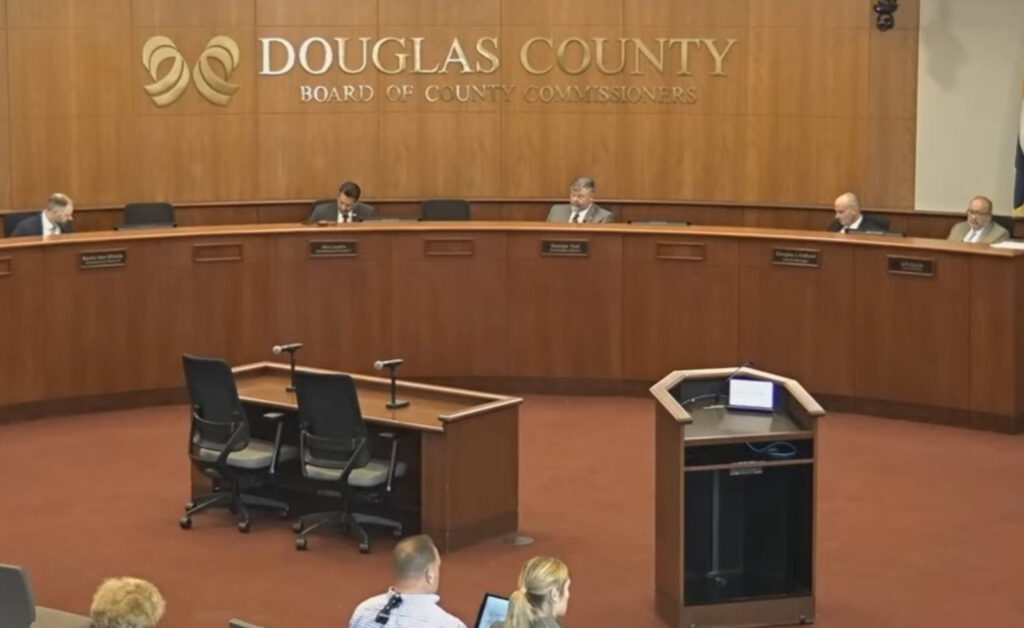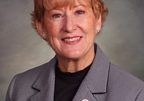By Jeffrey A. Roberts
CFOIC Executive Director
Three Douglas County residents plan to appeal a judge’s order rejecting their claims that county commissioners had “run roughshod” over the Colorado Open Meetings Law by discussing public business in a series of private, unnoticed meetings.
Douglas County District Court Judge Robert Lung on Tuesday denied a motion for a preliminary injunction filed by state Rep. Bob Marshall, former Dougco commissioner Lora Thomas and Julie Gooden, ruling they “are not reasonably likely to succeed on the merits of their case.”

Their lawsuit alleges that the county commission decided — prior to a public meeting on March 25 — to move forward with a ballot referendum asking voters to convert the county into a home rule entity. Because they believe the board rubber-stamped its decision on March 25 after engaging in “a series of unlawfully closed public meetings,” they asked the court to invalidate board resolutions calling for a June 24 special election on the home rule question.
But the judge, who held a hearing on the case April 29, ruled that he “heard no evidence that policy discussions or formal actions occurred” during what the commissioners called advance planning meetings.
County Attorney Jeffrey Garcia and Commissioner George Teal “testified that these meetings are held from time to time to coordinate schedules and discuss such matters as communications with the public and media pertaining to various matters of County business, but that there were no substantive discussions about the Home Rule Resolutions at these meetings,” Lung wrote.
While the advance planning meetings “might create the opportunity for a violation of OML, they do not inherently violate the OML,” the judge added. “Whether there was a violation is determined by whether there were substantive discussions that were part of the policy-making functions of the Board.”
He also decided that “informal” elected officials’ luncheons attended by a quorum of the three-person county commission did not violate the open meetings law, even though the commissioners convened executive sessions afterward to obtain legal advice from Garcia “on the ramifications of referring Home Rule to the voters.” The commissioners did not strictly adhere to “the proper steps for adjourning to an Executive Session from an open meeting,” Lung wrote, but he also determined that the luncheons were not covered by the open meetings law.
The judge based his ruling in part on the Colorado Supreme Court’s 2004 decision in Board of County Commissioners of Costilla County v. Costilla County Conservation District. “[A] meeting must be part of the policy-making process to be subject to the requirements of the OML,” the decision says.
“If, as a threshold matter, a meeting is part of the policy-making process, then the requirements of the OML must be met. If not, nothing in the OML prevents some or all members of a local governing body from attending a meeting, even if public notice has not been given,” it adds.
Marshall, Thomas and Gooden are represented by attorney Steve Zansberg, who is president of the Colorado Freedom of Information Coalition. In an email Wednesday, Zansberg said the plaintiffs had filed a notice of appeal and a motion with the district court asking for an injunction pending the appeal.
Their motion for a preliminary injunction said the county commissioners had “run roughshod” over the open meetings law. In a proposed ruling, which Lung rejected, Zansberg wrote that the commissioners violated the open meetings law “multiple times” by failing to properly convene executive sessions, failing to properly notice 11 advance planning meetings conducted from December through March, and by making a decision outside of public view.
Zansberg also cited the Supreme Court’s Costilla County decision: “[I]f a public body holds a private meeting in violation of the OML, the remedy is to invalidate any ‘resolution, rule, regulation, ordinance, or formal action … taken or made’ at the meeting.”
There is “undisputed evidence,” Zansberg wrote, that the county commissioners had reached a ‘consensus’ before their March 25 meeting that they would refer the home rule matter to the voters, “and that they did so outside of any meeting that was noticed and attended by the public.” Among the evidence: the county attorney and director of communications “took steps to implement that unanimous decision of the Commissioners in early- to mid-March, including by preparing the two formal Resolutions for official BOCC approval and by distributing draft Press Releases, talking points, and a full, detailed ‘Run of Show’ for the scripted events of March 25, 2025.”
On March 25, before the commissioners’ public vote, Garcia told those attending a local leaders luncheon, “Today, the board of county commissioners for Douglas County is going to pass two resolutions, one calling for an election, asking two questions. The first question is, should we create a home rule charter commission? And the second will be, who will be the members?”
The commissioners praised Lung’s ruling in an online statement: “Today marks a significant victory for the people of Douglas County and their constitutional right to vote,” said Commissioner Kevin Van Winkle. “We will not allow anyone to undermine our democracy or silence the voices of our citizens. We stand firm in our commitment to protecting the rights of every voter in our community.”
Follow the Colorado Freedom of Information Coalition on X or BlueSky. Like CFOIC’s Facebook page. Do you appreciate the information and resources provided by CFOIC? Please consider making a tax-deductible donation.




